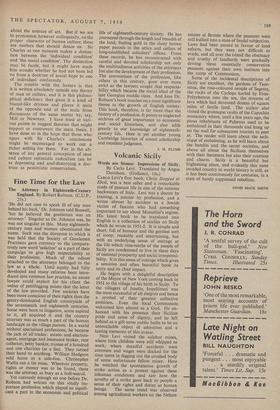Fine Time for the Law
'HE did not care to speak ill of any man behind his back,' Dr. Johnson told Boswell, 'but he believed the gentleman was an attorney.' Singular as Dr. Johnson was, he was not singular in this. Many eighteenth- century men and women abominated the name. Such was the disrepute in which it was held that the Society of Gentlemen Practisers gave currency to the compara- tively new word 'solicitor' as a part of their campaign to give high respectability to their profession. Much of the odium attached to the attorneys belonged to the law as a whole. Until equity had fully developed and many reforms been intro- duced into common law practice, an astute lawyer could exploit for his client the welter of pettifogging points that the letter of the law provided. Few societies have been more conscious of their rights than the gentry-dominated English countryside of the seventeenth and eighteenth centuries. Some were born to litigation, some aspired to it, all acquired it and the country attorney was as much a part of the human landscape as the village parson. In a world without specialised professions, he became the jack of all trades: estate- and election- agent, mortgage and insurance broker, rent collector, petty banker, trustee of a hundred and one charities (at a fee). They turned their hand to anything. William Hodgson sold hams as a side-line. Christopher Wallis ran a tin mine. Wherever property, rights or money was to be found, there was the attorney as busy as a boll-weevil.
Yet curiously enough no one before Dr. Robson had written on this vitally im- portant profession which played so signifi- cant a part in the economic and political life of eighteenth-century society. He has journeyed through the length and breadth of the land, finding gold in the dusty brown paper parcels in the attics and cellars of long-established solicitors' offices. From these records, he has reconstructed with careful and devoted scholarship not only the multitudinous activities of the attorneys but also the development of their profession. The conventions of the profession, like others in this century, grew ever more strict as the lawyers sought that respecta- bility which became the social ideal of the late Georgian middle class. And here Dr. Robson's book touches on a most significant theme in the growth of English society. This book, therefore, is far more than the history of a profession. It points to neglected archives of great importance to economic and social historians, and also adds greatly to our knowledge of eighteenth- century life. Here is yet another young Cambridge historian of sound scholarship and excellent judgment.
J. H. PLUMB


























 Previous page
Previous page